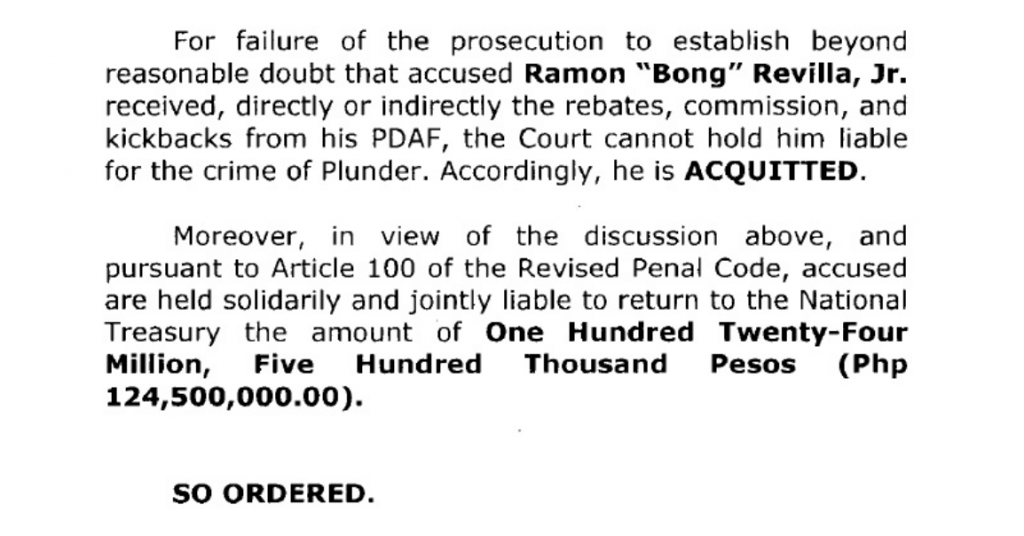Revilla Plunder Acquittal: Only Some Reports Explained Liability Question

THE PORK barrel scam was arguably the biggest corruption scandal in recent years. The first court decision on one of the high profile cases filed in 2013 was announced on December 7. But it was not the verdict that many had hoped for and caused some amount of public confusion that only a few media reports helped dispel.
The justices of the Sandiganbayan SpecialFirst Division, voting 3-2, acquitted former senator Ramon “Bong” Revilla of plunder charges in connection with the diversion of some PHP10-billion in Priority Development Assistance Funds (PDAF) — but found two of his alleged accomplices guilty.
Revilla was accused of taking kickbacks amounting to PHP224.5 million for funneling PDAF, or pork barrel funds to the bogus foundations of alleged scam mastermind Janet Lim Napoles. Also implicated in the scheme was Revilla’s former legislative officer Richard Cambe, as well as then senators Juan Ponce Enrile and Jinggoy Estrada, the latter of which has been released on bail during the Duterte administration. Napoles and Cambe have been sentenced to reclusion
A significant development in the country’s justice system, the decision made the headlines as expected. Media reports noted that Revilla was acquitted due to the prosecution’s supposed failure to “establish (his guilt) beyond
News accounts cited the anti-graft court’s reasons for the verdict. Besides recalling what the majority decision said, as well as the dissenting opinions of two of the Sandiganbayan justices, also noted were the reactions and comments by concerned parties, most of whom were befuddled by Revilla’sacquittal. While media coverage was extensive enough, only a few reports explained the contentious parts of the verdict.
CMFR monitored the three Manila broadsheets Manila Bulletin, the Philippine Daily Inquirer and The Philippine Star; the primetime newscasts 24 Oras (GMA-7), Aksyon (TV5), News Night (CNN Philippines) and TV Patrol (ABS-CBN 2); as well as selected news websites from December 7 to 11, 2018.
Civil liability question
One nagging question arose from the court verdict: Is Revilla civilly liable despite his acquittal?
The third paragraph of the dispositive portion of the decision states that the “accused are held solidarily and jointly liable to return to the National Treasury” the amount of PHP124.5 million. This part of the decision was confusing because it did not specify who among the accused –Revilla, Cambe and Napoles – are being ordered to return the money. In fact, Associate Justice Geraldine Faith Econg, the ponente of the decision, admitted as much and said the Revilla camp may file a motion for clarification.
Most of the news accounts skipped the civil liability question. But there were exceptions.
An Inquirer report on December 9 quoted the views of Fr. Ranhilio Aquino, dean of San Beda University Graduate School of Law, andIntegrated Bar of the Philippines (IBP) President Abdiel Fajardo, who both agreed that Revilla may still be found civilly liable despite his acquittal.
The Inquirer cited Aquino’s December 7 social media post in which he said that a court may acquit a defendant but still find him liable to return or pay a certain amount. Aquino added that for a criminal conviction such as in the plunder case against Revilla, proof beyond reasonable doubt is required, but that civil liability only needs a preponderance of
CNN Philippines featured a discussion of Aquino’s and Fajardo’s views in its December 10 online report.
In the Star’s report on December 10, Fajardo argued that Revilla’s acquittal does not necessarily absolve him of civil liability because the court seemed “convinced that the prosecution was able to submit a preponderance of evidence” that the former senator must be held “equally accountable.”
Speaking on the issue of civil liability in CNN Philippines’ The Source on December 10, former Supreme Court spokesperson and lawyer Theodore Te said the problem stems from the fact that the order to return the PHP124.5 million to the government does not actually say that Revilla is excluded.
Te pointed out inconsistencies in the decision, as well as the failure of the decision to state that the basis of civil liability does not exist, as required by the Rule 120, Section 2 of the Rules of Court. Te also discussed this point in an analytical piece published earlier on December 8under Rappler’s “Thought Leaders” section.
“[This] is what the court is saying: He (Revilla) is not criminally liable because they were not able to prove his guilt beyond reasonable doubt, but the act of the money being transferred, being removed from the treasury – that was proven… So he’s liable,” Te said. If
Leave a Reply